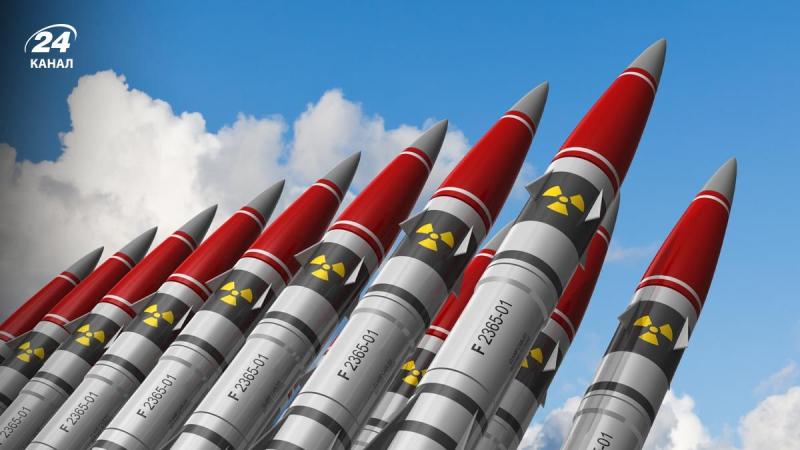Discussion around nuclear strategy/Getty Images Against the background of Trump's possible second term in the United States, the discussion about the nuclear deterrence strategy is intensifying. Analysts are questioning what Washington should do to counter nuclear-armed rivals like Russia and China. In this story Channel 24 tells the most important things from The Economist article, which talks about possible risks for the West due to the nuclear threat. At the same time, he focuses on the Russian-Ukrainian war, which plays an important role in shaping policy regarding dangerous nuclear energy in the civilized world. Whoever wins the US presidential election in November 2024 will still have to manage the nuclear complex, which is experiencing a 30-year $1.5 trillion upgrade. These are the following projects: These programs were approved last decade with bipartisan support, but after Russia's full-scale invasion of Ukraine, the geopolitical situation has changed. Also, in addition to the Kremlin using nuclear threats, China is increasing its arsenal. Beijing had only 300 nuclear warheads in 2019, now it is 500 units. The Pentagon expects the number to rise to 1,000 before the end of the decade. Washington has more reason to worry about its nuclear strategy, as it must confront both Russia and China. Nuclear planners are now considering issues that ten years ago would have seemed irrelevant and creepy, analysts write. The US is considering various scenarios, but there are skeptics who argue that the challenges are exaggerated. According to some experts, America's arsenal remains ten times larger than China's, and the Russian-Ukrainian war has not changed the balance of nuclear forces in the world all that much. Together Moreover, even during Trump’s first presidency, work began on a new underwater nuclear cruise missile, known by the abbreviation SLCM-N. The Biden White House tried to cancel the project, arguing it was expensive and unnecessary. However, Congress and the Senate stood in the way. In general, analysts call Trump and his supporters supporters of a hard nuclear position. We are talking, in particular, about the deployment of 3,500 units of corresponding weapons, compared to 1,670 that the United States currently has under the restrictive treaty. If Biden is elected, most ideas for strengthening nuclear capacity will undoubtedly remain unimplemented. Although even if Trump is elected, there are obstacles to nuclear rampant, because four years is a very short time in the field of nuclear modernization. America does not have the ability to produce a large number of new warheads, however, it has about 1,900 nuclear weapons in reserve. It could double its deployed arsenal. Russia could increase it by 57%, adding just under 1,000 units. The only problem is that the START treaty limits this, but it ends in 2026. In addition, the Kremlin announced its withdrawal from it. Additionally, Jeffrey Lewis of the Middlebury Institute of International Studies believes Trump could, if elected, focus on arms control with Russia and China to demonstrate his business acumen. The expert recalls Trump's meetings with Kim Jong-un in 2018 and 2019 as an example. Lewis says it will be important to see whether Trump backs away from his party's position on strengthening missile defense systems, which Russia and China have actively opposed. According to experts, Russia has financial and material limitations in increasing its nuclear capacity. The war against Ukraine could cost the Kremlin $132 billion by the end of 2024. Russia does not currently suffer from a warhead shortage, but new delivery systems are overdue and over budget. China has more financial leverage, but plutonium shortages could limit Beijing's arsenal over the next decade. And the rush to create weapons could also lead to corners being cut. Actually, it is not exclusive that China's current nuclear expansion may already be reaching its limits. The conclusion from all this is this: any arms race is likely , will be slow and sluggish rather than fast and stormy. For US allies, the calculation is a little different. European NATO members and several Asian countries, notably Japan and South Korea, are protected by US nuclear weapons through “extended deterrence”. At the same time, many would really be happy for Trump to create more nuclear weapons. But European and Asian allies of the United States are worried whether the new leader will support them in the White House, especially given the dramatic changes in policy. North Korea's missile program and China's expanding nuclear arsenal threaten America's security, leaving it vulnerable to attack. This is a concern for even the most allied-friendly president, not to mention Trump.
Nuclear security debated in the US
A new arms race is just around the corner
How many opportunities do participants in the political game have
On the threshold of new challenges< /h2>
Biden has tried to reassure partners, particularly Japan and South Korea, by deepening consultations on nuclear issues and demonstrating military support through public visits by U.S. submarines to the region. Interestingly, South Korea has developed its own ballistic missiles despite not officially having nuclear weapons.
Relations between the US and North Korea have been tense during the Trump era, despite attempts at dialogue. This prompted South Korea to consider developing its own nuclear program, especially after the country's leadership changed to a more conservative one.
Europe faces its own challenges with two nuclear powers – the UK and France , which are still not capable of completely replacing the American “nuclear umbrella”. Rising tensions and potential conflicts are forcing allies to consider their own security and the possibility of developing nuclear weapons.
Overall, these debates and reflections on security indicate the instability of the international order and the ever-growing importance of nuclear weapons in the politics of large states. At the same time, the question about the future of international nuclear alliances and the deterrence strategy is acute, and there is no answer to it.

